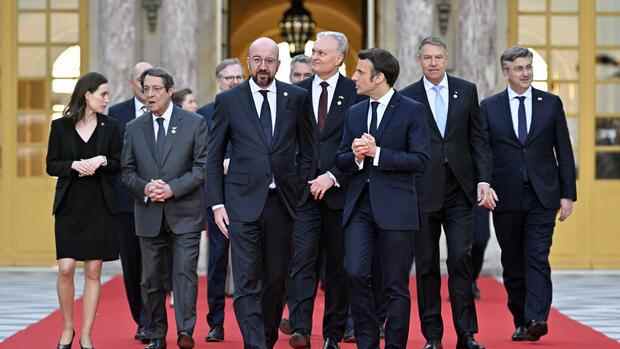Ukraine is to get half a billion euros worth of weapons and other equipment from the European Union to fight the Russian invasion. Foreign policy representative Josep Borrell made a corresponding proposal at the EU summit in Versailles, France.
The Spaniard said on Friday that he was certain that the heads of state and government would approve the project. The plan should be implemented quickly. A first package of 500 million euros for weapons and equipment had already been approved at the end of February.
The EU states also want to address dependencies, for example in the supply of microchips. According to the draft of the summit declaration, production in the EU is to be quadrupled to 20 percent of the world market by 2030. In addition, dependencies should be reduced for critical raw materials, health care, digital and food.
Top jobs of the day
Find the best jobs now and
be notified by email.
In the final declaration from early Friday morning, Ukraine was promised moral support and long-term hope for membership in the confederation of states. The country is part of the European family, and then they want to work to further strengthen ties and deepen the partnership.
Scholz under pressure
With regard to a possible ban on Russian energy imports, Scholz reiterated his position that the sanctions against Moscow should have as little impact as possible on the EU states themselves.
He sees the German energy supply in the event of an import embargo not secured. Scholz received support from Austria’s Chancellor Karl Nehammer. “Austria cannot now say that we are doing without Russian natural gas, we need it,” said the conservative politician. The energy supplies are controversial mainly because Russia earns billions that it could use for the war against Ukraine.
Scholz was under particular pressure because of his refusal to stop imports of oil, gas and coal from Russia. “I am convinced that we should take the decision to stop energy imports from Russia in order to bring (Russian President Vladimir) Putin to the negotiating table and end the war,” said Latvian Prime Minister Krisjanis Karins. The President of the European Parliament, Roberta Metsola, stressed the need to send a clear message and restrict Russian exports.
Both sided with countries like Poland and Lithuania, which had already spoken out in favor of such a move. This is intended to deprive the Russian state of its main source of income for financing the war against Ukraine.
According to estimates by the Brussels think tank Bruegel, the EU countries currently spend around 420 million dollars (380 million euros) on Russian gas and almost 400 million dollars (362 million euros) on oil from Russia. This is mainly due to the fact that countries such as Germany, Austria and Hungary cover a large part of their energy requirements with supplies from Russia.
>> Read about this: How Russia’s war is throwing energy markets into chaos
Hungary’s Prime Minister Viktor Orban said in a video on his Facebook page that Russian gas and oil would not be subject to punitive measures. The decision on the most important topic was good. “There will be no sanctions on gas or oil, so energy supply to Hungary is safe.”
Tensions were also evident during the summit over the question of how to deal with Ukraine’s desire for quick accession to the EU. The Dutch Prime Minister Mark Rutte gave the request a clear rejection. “There is no such thing as accelerated accession,” he said.
His Luxembourg colleague, Xavier Bettel, said he was not a rule freak, but that there were conditions for joining the EU. Chancellor Scholz made a similar statement. “It is very important that we continue to pursue the things that we have decided in the past,” he said.
After the first day of the summit, Slovenian Prime Minister Janez Jansa said that opinion was divided. The majority see that Ukraine is at war and people are fighting for their lives, others are still debating the procedure.
On the night of Friday, the Ukrainian President Volodymyr Zelenskiy even spoke of the “final test for Europe” with regard to the accession question. He believes “that our people, our state, our army have already done everything to see us there among equals, to invite us there,” he said in a video message.
However, no concrete commitments were made to Ukraine in the final declaration. Instead, it just says that Ukraine belongs to the European family. At the same time, countries such as Estonia and Lithuania had urged that Kyiv should be made more accommodating.
Dealing with the economic consequences of the war is also an issue
Another hot topic at the two-day summit is how to deal with the effects of the war on economic development in the EU. France, for example, brought up the idea of adopting a debt-financed support program, as it did during the corona crisis. This could therefore help to cushion the consequences of the current increase in energy prices, but also promote investments in defense projects.
Countries like Germany and the Netherlands do not consider this necessary at the moment and point out that the 800 billion euro Corona aid package should first be used up.
Italian Prime Minister Mario Draghi, on the other hand, was open to the French proposal. “Italy and France are also completely aligned on this front,” Draghi said.
EU Commission President Ursula von der Leyen announced at the summit that she intended to propose a temporary cap on energy prices. It is therefore a question of limiting the “contagion effects” between gas prices and electricity prices.
More: Europe in the energy crisis: EU Commission considers electricity price cap
